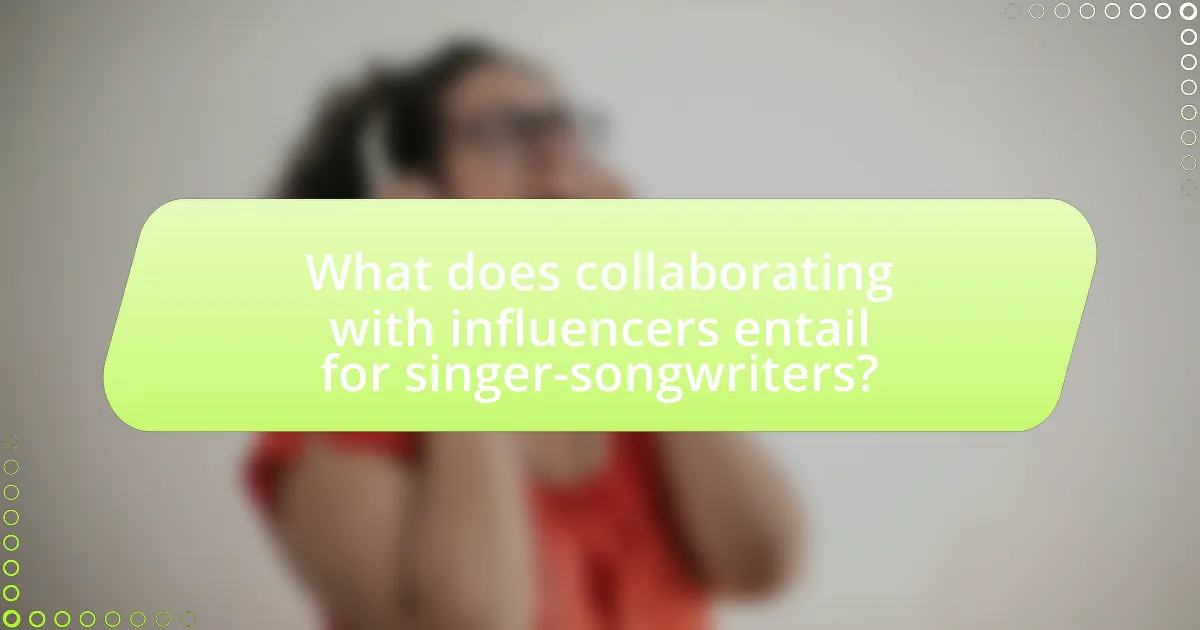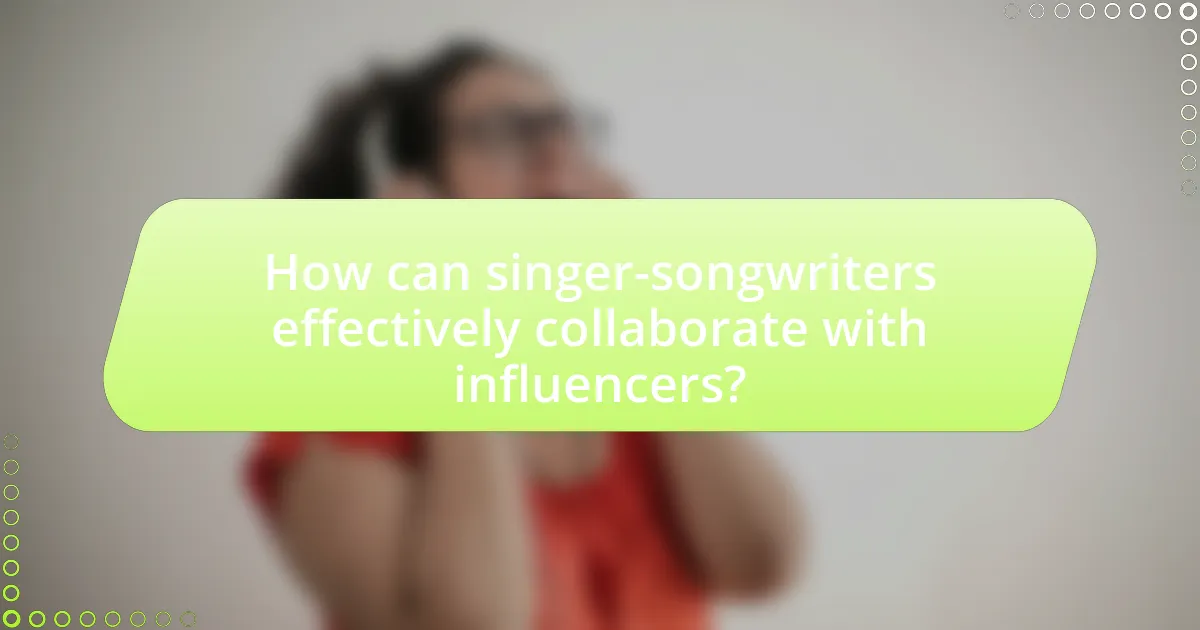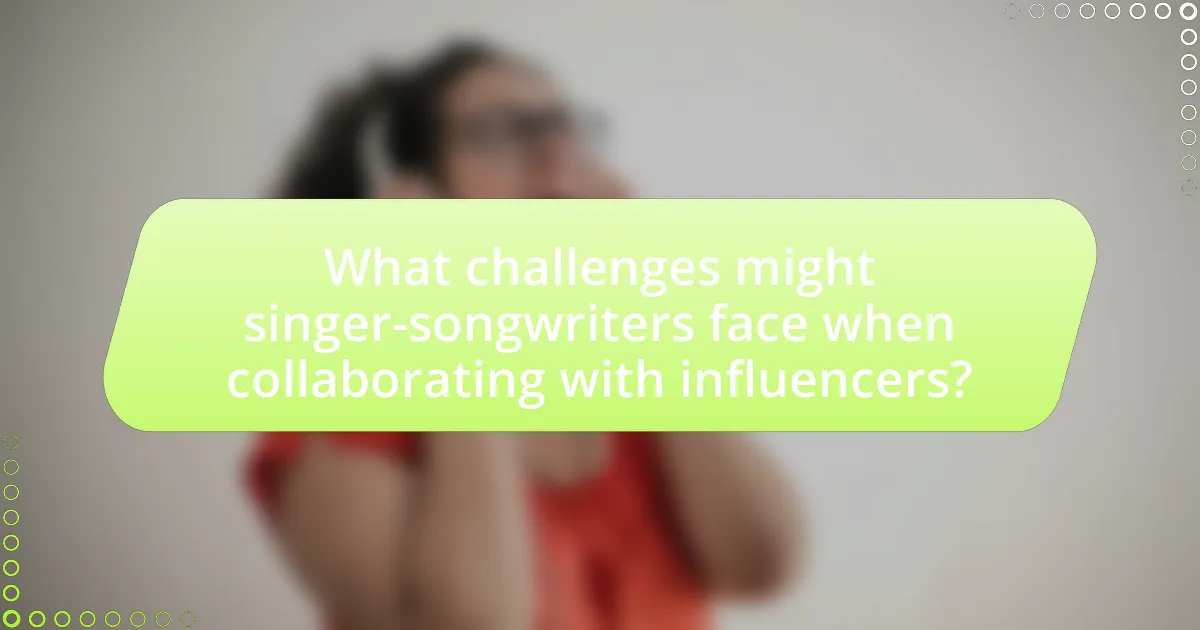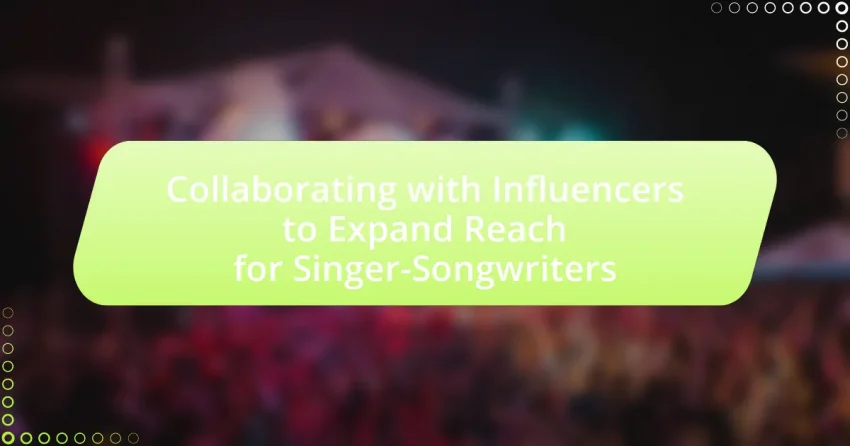Collaborating with influencers is a strategic approach for singer-songwriters to enhance their music visibility and expand their audience reach. This article explores the process of identifying suitable influencers, the criteria for selection, and the potential benefits of such partnerships, including increased engagement and brand awareness. It also addresses the challenges singer-songwriters may face during collaborations and offers practical tips for maximizing the effectiveness of these partnerships. Key metrics for measuring success and examples of successful collaborations are discussed, providing insights into how influencer partnerships can significantly impact a singer-songwriter’s career.

What does collaborating with influencers entail for singer-songwriters?
Collaborating with influencers entails singer-songwriters partnering with individuals who have a significant online following to promote their music and brand. This collaboration often includes creating content together, such as music videos, social media posts, or live performances, which can enhance visibility and engagement with a broader audience. For instance, a study by the Influencer Marketing Hub indicates that 63% of marketers plan to increase their influencer marketing budgets, highlighting the effectiveness of such collaborations in reaching target demographics.
How can singer-songwriters identify the right influencers to collaborate with?
Singer-songwriters can identify the right influencers to collaborate with by analyzing the influencer’s audience demographics, engagement rates, and content relevance. By ensuring that the influencer’s followers align with the singer-songwriter’s target audience, they can maximize the impact of their collaboration. Research indicates that collaborations with influencers who have a strong connection to the artist’s genre or style lead to higher engagement and conversion rates, as seen in a study by Influencer Marketing Hub, which found that 63% of marketers believe influencer partnerships are effective for brand awareness.
What criteria should be considered when selecting influencers?
When selecting influencers, key criteria include audience alignment, engagement rates, content quality, and authenticity. Audience alignment ensures that the influencer’s followers match the target demographic of the singer-songwriter, which is crucial for effective outreach. Engagement rates, measured through likes, comments, and shares, indicate how actively the influencer’s audience interacts with their content, reflecting potential reach and impact. Content quality assesses the aesthetic and thematic relevance of the influencer’s posts to the singer-songwriter’s brand, ensuring a cohesive collaboration. Authenticity, often gauged through the influencer’s genuine connection with their audience, enhances trust and credibility, making the partnership more effective. These criteria collectively contribute to a successful influencer collaboration strategy for singer-songwriters.
How does an influencer’s audience align with a singer-songwriter’s target demographic?
An influencer’s audience often aligns with a singer-songwriter’s target demographic through shared interests in music genres, lifestyle, and cultural trends. For instance, if a singer-songwriter specializes in pop music, collaborating with an influencer who has a following of young adults interested in pop culture can effectively reach potential fans. Data from social media analytics shows that influencers typically attract followers who resonate with their content, which often includes music recommendations, lifestyle choices, and personal branding that reflects the singer-songwriter’s image. This alignment enhances the likelihood of engagement and conversion, as both the influencer’s audience and the singer-songwriter’s target demographic are likely to have overlapping preferences and values.
What are the potential benefits of influencer collaborations for singer-songwriters?
Influencer collaborations provide singer-songwriters with increased visibility and access to new audiences. By partnering with influencers who have established followings, singer-songwriters can leverage the influencer’s reach to promote their music, leading to greater exposure and potential fan growth. For instance, a study by Influencer Marketing Hub found that 63% of marketers believe influencer collaborations effectively increase brand awareness, which directly applies to musicians seeking to expand their listener base. Additionally, these collaborations can enhance credibility, as influencers often endorse products or artists they genuinely support, thereby fostering trust among their followers.
How can influencer partnerships increase visibility and reach?
Influencer partnerships can significantly increase visibility and reach by leveraging the established audience and credibility of influencers. When a singer-songwriter collaborates with an influencer, they gain access to the influencer’s followers, who may be more likely to engage with the artist’s content due to the influencer’s endorsement. For instance, a study by the Digital Marketing Institute found that 49% of consumers depend on influencer recommendations, indicating that influencer partnerships can effectively drive awareness and engagement. Additionally, influencers often create authentic content that resonates with their audience, further amplifying the singer-songwriter’s message and expanding their reach across social media platforms.
What impact do influencers have on audience engagement and loyalty?
Influencers significantly enhance audience engagement and loyalty by leveraging their established trust and relatability with followers. Their authentic endorsements can lead to increased interaction rates, as studies show that influencer marketing can yield engagement rates up to 11 times higher than traditional forms of advertising. Additionally, influencers create a sense of community among their followers, fostering loyalty through consistent and relatable content. This connection is evidenced by a survey from the Digital Marketing Institute, which found that 49% of consumers depend on influencer recommendations for their purchasing decisions, indicating a strong correlation between influencer presence and audience commitment.

How can singer-songwriters effectively collaborate with influencers?
Singer-songwriters can effectively collaborate with influencers by aligning their music and brand with influencers whose audience matches their target demographic. This strategic partnership can amplify the singer-songwriter’s reach and engagement. For instance, a study by Influencer Marketing Hub indicates that 63% of marketers believe influencer collaborations enhance brand awareness, demonstrating the potential impact of such partnerships. By leveraging influencers to promote new releases, share behind-the-scenes content, or host live sessions, singer-songwriters can tap into the influencer’s established audience, thereby increasing their visibility and fan base.
What strategies can be employed to initiate collaborations with influencers?
To initiate collaborations with influencers, singer-songwriters should first identify influencers whose audience aligns with their music genre and brand. This targeted approach ensures that the collaboration reaches a relevant audience, increasing the likelihood of engagement. Next, singer-songwriters can engage with influencers by commenting on their posts, sharing their content, or sending personalized messages that express genuine interest in their work. This establishes rapport and demonstrates authenticity. Additionally, offering value, such as exclusive content, behind-the-scenes access, or co-creating content, can incentivize influencers to collaborate. Research indicates that 49% of consumers depend on influencer recommendations, highlighting the effectiveness of these strategies in expanding reach and engagement.
How should singer-songwriters approach influencers for partnerships?
Singer-songwriters should approach influencers by first researching and identifying those whose audience aligns with their music style and brand. This targeted approach increases the likelihood of a successful partnership. After identifying suitable influencers, singer-songwriters should craft personalized messages that highlight mutual benefits, such as how the collaboration can enhance the influencer’s content while promoting the singer-songwriter’s music.
For instance, a study by Influencer Marketing Hub indicates that 63% of marketers believe that influencer partnerships can significantly increase brand awareness. By leveraging this data, singer-songwriters can emphasize the potential reach and engagement that comes from collaborating with influencers, making their proposal more compelling.
What types of collaboration formats are most effective for singer-songwriters?
The most effective collaboration formats for singer-songwriters include co-writing sessions, featuring on each other’s tracks, and live performances together. Co-writing sessions allow singer-songwriters to blend their unique styles and ideas, resulting in innovative songs that appeal to a broader audience. Featuring on each other’s tracks helps both artists tap into each other’s fan bases, increasing exposure and reach. Live performances together create a shared experience for fans, enhancing engagement and promoting both artists simultaneously. These formats have been shown to enhance visibility and foster creative synergy, making them particularly beneficial in the competitive music industry.
What are the best practices for managing influencer collaborations?
The best practices for managing influencer collaborations include establishing clear objectives, selecting the right influencers, and maintaining open communication. Establishing clear objectives ensures that both the singer-songwriter and the influencer understand the goals of the collaboration, such as increasing brand awareness or driving sales. Selecting the right influencers involves assessing their audience demographics, engagement rates, and alignment with the artist’s brand values, which can significantly impact the effectiveness of the collaboration. Maintaining open communication throughout the partnership fosters a positive working relationship, allowing for feedback and adjustments as needed, which is crucial for achieving desired outcomes. These practices are supported by industry reports indicating that well-managed influencer collaborations can yield a return on investment of up to $6.50 for every dollar spent.
How can singer-songwriters ensure clear communication with influencers?
Singer-songwriters can ensure clear communication with influencers by establishing direct and concise messaging that outlines their goals and expectations. This involves crafting a well-defined proposal that includes specific collaboration ideas, timelines, and desired outcomes, which helps influencers understand the singer-songwriter’s vision. Additionally, utilizing platforms like email or professional social media channels for communication can enhance clarity, as these mediums allow for detailed exchanges and the ability to share multimedia content. Research indicates that clear communication increases the likelihood of successful collaborations, as it fosters mutual understanding and alignment on project objectives.
What metrics should be tracked to measure the success of influencer collaborations?
To measure the success of influencer collaborations, key metrics include engagement rate, reach, conversion rate, and return on investment (ROI). Engagement rate quantifies interactions such as likes, comments, and shares relative to the audience size, indicating how well the content resonates. Reach measures the total number of unique users who see the content, providing insight into the collaboration’s visibility. Conversion rate tracks the percentage of users who take a desired action, such as signing up for a newsletter or purchasing music, reflecting the effectiveness of the collaboration in driving specific outcomes. ROI evaluates the financial return generated from the collaboration compared to the costs incurred, ensuring that the investment yields profitable results. These metrics collectively provide a comprehensive view of the collaboration’s impact on expanding reach and achieving marketing goals for singer-songwriters.

What challenges might singer-songwriters face when collaborating with influencers?
Singer-songwriters may face challenges such as misalignment of brand values when collaborating with influencers. This misalignment can lead to a disconnect between the artist’s image and the influencer’s persona, potentially alienating fans. Additionally, singer-songwriters might encounter difficulties in negotiating fair compensation, as influencers often have varying rates and expectations based on their reach and engagement metrics. Furthermore, the creative control over the content can be a significant issue; singer-songwriters may feel pressured to conform to the influencer’s style or audience preferences, which can dilute their artistic expression. These challenges highlight the complexities of ensuring a successful partnership that benefits both parties while maintaining authenticity.
How can singer-songwriters navigate potential pitfalls in influencer partnerships?
Singer-songwriters can navigate potential pitfalls in influencer partnerships by conducting thorough research on the influencer’s brand alignment and audience demographics. This ensures that the partnership resonates with their own artistic identity and target audience, minimizing the risk of misalignment that could damage their reputation. For instance, a study by Influencer Marketing Hub indicates that 63% of consumers trust influencers more than brands, highlighting the importance of authentic partnerships. Additionally, establishing clear communication and expectations from the outset can prevent misunderstandings and ensure that both parties are aligned on goals and deliverables.
What are common misunderstandings that can arise in influencer collaborations?
Common misunderstandings in influencer collaborations include misaligned expectations regarding content creation, audience engagement, and compensation. Influencers may assume that their creative freedom is unrestricted, while brands often expect specific messaging and adherence to guidelines. Additionally, there can be confusion about the influencer’s audience demographics, leading to ineffective targeting. Compensation misunderstandings frequently arise, with influencers expecting payment for all forms of promotion, while brands may only budget for specific deliverables. These misunderstandings can hinder the effectiveness of collaborations and lead to dissatisfaction on both sides.
How can singer-songwriters protect their brand identity during collaborations?
Singer-songwriters can protect their brand identity during collaborations by establishing clear agreements that outline the terms of the partnership. These agreements should specify the roles, responsibilities, and creative input of each party, ensuring that the singer-songwriter’s artistic vision and brand values are maintained. Additionally, they should conduct thorough research on potential collaborators to ensure alignment in style and audience, which helps preserve their brand integrity. For instance, a study by the Berklee College of Music highlights that artists who engage in strategic collaborations that reflect their brand identity experience greater audience retention and loyalty.
What are some successful case studies of singer-songwriters collaborating with influencers?
Successful case studies of singer-songwriters collaborating with influencers include the partnership between Halsey and TikTok influencers, which significantly boosted her song “Without Me.” This collaboration led to a viral trend on the platform, resulting in over 1 billion views and a substantial increase in streaming numbers. Another example is Ed Sheeran’s collaboration with YouTube influencers for the promotion of his album “Divide,” which helped him reach a younger audience and contributed to the album’s chart-topping success worldwide. These collaborations demonstrate the effectiveness of leveraging influencer platforms to enhance visibility and engagement for singer-songwriters.
What lessons can be learned from these successful collaborations?
Successful collaborations between singer-songwriters and influencers demonstrate the importance of strategic alignment and audience engagement. These partnerships highlight that aligning values and aesthetics between the artist and influencer can enhance authenticity, leading to increased audience trust and engagement. For instance, when singer-songwriters collaborate with influencers who share similar musical tastes or lifestyles, they can effectively tap into the influencer’s established audience, resulting in a broader reach. Data from a 2021 study by Influencer Marketing Hub indicates that 63% of consumers trust influencers more than traditional advertisements, underscoring the effectiveness of these collaborations in reaching target demographics. Additionally, successful collaborations often involve clear communication and mutual benefit, ensuring that both parties achieve their goals, whether in terms of exposure, content creation, or audience interaction.
How did these collaborations impact the careers of the singer-songwriters involved?
Collaborations with influencers significantly enhanced the careers of the singer-songwriters involved by broadening their audience reach and increasing their visibility in the music industry. For instance, when singer-songwriters partnered with popular social media influencers, they gained access to millions of followers, which often resulted in a substantial increase in streaming numbers and social media engagement. A notable example is the collaboration between singer-songwriter Halsey and influencer James Charles, which led to a spike in her song’s popularity on platforms like TikTok, showcasing how influencer partnerships can directly translate into commercial success. Additionally, these collaborations often resulted in increased opportunities for live performances and features in media outlets, further solidifying the artists’ presence in the competitive music landscape.
What practical tips can singer-songwriters follow to maximize their influencer collaborations?
Singer-songwriters can maximize their influencer collaborations by establishing clear communication and aligning their brand values with those of the influencer. Clear communication ensures that both parties understand expectations, deliverables, and timelines, which can lead to more effective partnerships. Aligning brand values is crucial because collaborations resonate better with audiences when both the artist and influencer share similar messages or aesthetics.
Additionally, singer-songwriters should leverage data analytics to identify influencers whose audience demographics match their target listeners, enhancing the likelihood of engagement. Research indicates that collaborations with influencers who have a genuine connection to the artist’s music can increase audience trust and interest, leading to higher conversion rates.
Finally, creating unique and engaging content tailored for the influencer’s platform can further enhance visibility and engagement. For instance, behind-the-scenes footage or exclusive previews can captivate audiences and encourage sharing, amplifying the reach of both the singer-songwriter and the influencer.
